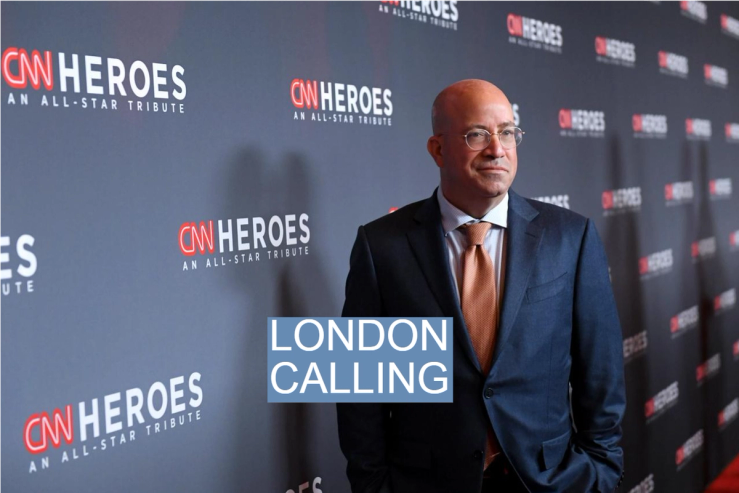The News
A British regulator will decide Monday whether to allow the Abu Dhabi-backed investment group RedBird IMI, represented by former CNN chief Jeff Zucker, to take control of The Telegraph, or whether to move the deal to another stage of review and give its opponents more time to kill it.
The decision by Culture Minister Lucy Frazer will have long-term consequences for British politics.
But the process has also set the stage for global media’s most confusing and entertaining public meltdown, in which the former CNN chairman finds himself in an escalating personal battle with the bombastic 74-year old Scottish Tory media grandee Andrew Neil.
To hear Zucker tell it, as he did on the influential podcast “The News Agents” podcast Friday, a straightforward American news executive looking to invest in a great newspaper is standing up to tricksy natives.
Zucker says he discovered that Neil, a former Sunday Times editor and BBC presenter who currently chairs The Spectator, is “quite the hypocrite.” Zucker says Neil sought a job as chairman of a combined Spectator and Telegraph, and only turned on the deal after Zucker spurned him. “We said no thanks, and ever since that day he’s been one of our most vocal critics,” Zucker said. “Gimme a break.”
Know More
In Neil’s telling, it’s a different story as old as time: arrogant, big money Americans stomping on British folkways. Or, as he put it in an email to me, “When Zuckie came on the scene we were dealing with someone who was ignorant of Britain, British media and British newspapers/magazines and was basically a front for Arab money. We didn’t know he was also a liar. Now we do.”
The short-lived courtship began in December, when Zucker and Neil had a cordial lunch in New York City. The lunch, people close to both say, was not focused on business, though of course the subtext was the 11th-hour intervention by Redbird IMI, Zucker’s firm, to forestall an auction of the Telegraph Media Group by repaying its debt.
Later that month, both sides say, Neil had a conversation with another person on the Redbird side of the deal that included talk of putting Neil in charge. Neil says he “never floated nor sought a combined chairmanship.” While Zucker cast the larger job as a “request” from Neil, another person familiar with Redbird’s version of the account backed down from that claim, and said the idea “emerged in conversation” between Neil and Redbird’s representative.
Then, in early January, Zucker and Neil spoke on the phone for 18 minutes, a person familiar with the call said. Zucker had planned to offer Neil a modest role on an editorial trust intended to protect the Spectator from interference. That’s when Zucker says Neil proposed the bigger job — and inquired about a payday, both of which Neil flatly denies.
Neil soon turned hard from private talks with Zucker to campaigning against the deal. He told the BBC later that month that it would be “absurd” to allow a “dictatorship” to take over the Telegraph, and promising to resign his Spectator post if the deal goes through.
Ben’s view
Zucker’s newfound passion for the Tory press is a bit hard to figure. The Telegraph has enormous political influence in Westminster, but suffers from the same business challenges as every other medium-sized newspaper in the world.
In fact, if there’s any lesson for the actual media business in this story, it’s that Zucker spoke out on “The News Agents.” That show, and its rival podcast “The Rest is Politics,” have abruptly seized a big slice of British political mindshare, and are the most interesting news businesses in Britain right now. I’m a bit surprised RedBird IMI isn’t trying to buy them.
But Zucker likes to win, and now finds himself on unfamiliar political ground, in a knife-fight with one of British media’s most gleeful public brawlers. (Neil is a man of the right, but he may be most familiar to American audiences for his demolition of the conservative commentator Ben Shapiro, who made the fatal error of not knowing who Andrew Neil was.)
And while I could obviously gossip all day about the personalities involved, the substantive stakes are high, and speak to the choices facing the right — and the right’s media outlets — all over the world.
In one corner is global capital, represented by Zucker, his partner the financier Gerry Cardinale, the former Chancellor of the Exchequer George Osborne, and Sheikh Mansour bin Zayed Al Nahyan.
In the other corner, leading bidders include Paul Marshall, a pro-Brexit hedge fund billionaire. Marshall bankrolls the fire-breathing New Right television outlet GB News, which outflanked and knocked out Rupert Murdoch’s more moderate TalkTV. (Marshall also publishes the heterodox opinion site UnHerd.)
Marshall, Zucker said, is “unfit to own a newspaper” after liking tweets that reflected an apocalyptic worldview on immigration — for instance, that it is “a matter of time before civil war starts in Europe. The native European population is losing patience with the fake refugee invaders.”
There are, it is worth saying, many other possible bidders. And there is no love for Marshall in Neil’s camp, either, which is hoping another bidder gets the paper. Neil co-founded, then quit, GB News. Marshall was, notably, not invited to the Spectator’s annual summer party.
But Zucker’s best pitch to the sitting Sunak government may in fact be that foreign money is the least-bad option. Would-be center-right figures in the United States and Britain find it hard enough to govern with the Murdoch press from The Sun to Fox News pressing them on immigration and gender politics. They may not relish shifting British papers further to the populist right, even as some members of Parliament try to give the body the power to block the RedBird IMI deal.
And the Telegraph’s sad state — financially troubled British owners looking to sell to a foreign conglomerate, with a populist billionaire waiting in the wings — may reflect, above all, the paucity of good choices in a diminished, post-Brexit Britain.
Room for Disagreement
The former Guardian editor Alan Rusbridger writes in the left-leaning Prospect that Marshall is a greater threat than foreign money: “If Sir Paul manages to add the Telegraph to his ownership of GB News, he will be holding the ring as the future of conservative politics is savagely fought out in the wake of what most assume will be a Labour victory at the coming election. Don’t expect much nuance or restraint. I anticipate it will make Enoch Powell’s rhetoric sound like Songs of Praise.”
The View From Dubai
The “Street of Shame” shouldn’t “lecture about editorial independence,” writes Frank Kane, a British journalist based in the Gulf who writes a column in Arabian Gulf Business Insight: “I have no idea how the struggle over the Telegraph will play out, but one thing is certain: the desire of media owners to influence the content of their publications is as old as the hills. That, surely, is why they want to own them.”
Notable
- Spectator editor Fraser Nelson is campaigning hard against the Redbird IMI deal: “Newspapers and magazines are not like trains or shopping centres: they’re a vital part of our democratic apparatus.”
- Management decisions at the Telegraph are more or less on hold after Frazier rebuked management for personnel changes.
- The House of Lords is considering a rule that would “prevent the acquisition of a UK news media organisation by a foreign power without the approval of both Houses of Parliament.”


